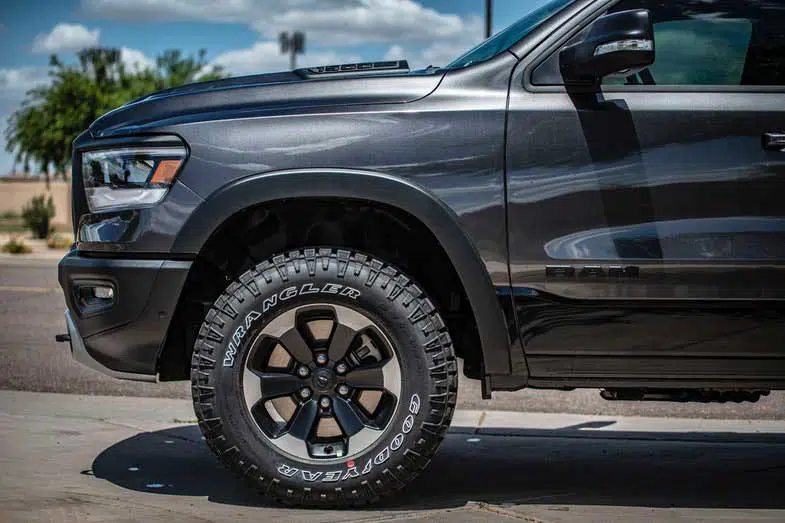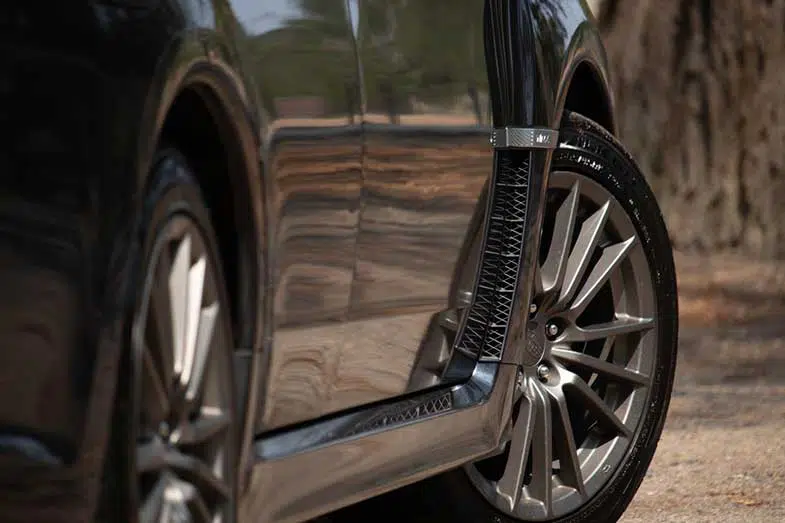There is a growing consumer consciousness to be more economical when buying tires. Many vehicle owners tend to hunt for rubber with higher mileage and extended tire warranties that will take them longer to replace regardless of brand.
Long-lasting tires have technologically reinvented tread compounds, softer sidewalls, and higher UTQG ratings, and may also affect performance. So you may be wondering which ones last the longest.
Which brand of tires last the longest? The Michelin Pilot Sport A/S 3+ All Season Performance Radial Tire is currently the most durable tire, providing superior grip and control. Michelin tires maintain wet braking performance throughout their entire life, even as they wear, which makes them a top choice for long-lasting tires.
Find more about the Michelin Pilot Sport A/S 3+ All Season Performance Radial Tire on Amazon. The Extreme Silica+ compound stays grippy when wet, and large 3-D sipes and rain grooves help prevent hydroplaning. Be confident with these long-lasting tires that provide excellent grip and control.
The answer to which brand of tires last the longest depends on your vehicle, but this article should help you specify a standout tire brand. Aside from identifying the most durable tire, this article will cover UTQG ratings, give you information on the best tire brand per category, and give you tips on how to make your tires last longer.
Are you looking for tires that won’t quit in the city, on the speedway, or even on dirt roads? We will cover them all.

Which Brand of Tires Last the Longest?
While it is difficult to nominate only one name-brand that will tough it out through all four seasons, there are standouts for each type of tire. Based on numerous product reviews, customer’s insights, and the tire’s actual performance rating, here are the most durable tires per category:
| Type of Tire | Brand & Model | Specs & Key Features | Pros | Cons |
| All-Season Ultra High-Performance All-Season | Michelin Pilot Sport A/S 3+ | Tread warranty: 45,000 miles Load capacity: 1,102-2,601 lbs UTQG rating: 500 AA A Weight: 21-38 lbs For sports cars, high-performance sedans, pickups, SUVs, or crossovers Wide circumferential grooves and 3-D sipes; Helio+, Extreme Silica, and Variable Contact Patch 3.0 technology | Best Choice by Car Bibles, Best Value by TheDrive.com in 2020 Wet-road grip power Dry road heat-wear protection Asymmetric tread pattern provides high-speed lateral grip and control | Hard to balance Gets noisy through a long ride over time Summer-tire characteristics compromise ride quality and comfort |
| Performance All-Season | Yokohama Advan Sport A/S | Tread warranty: 50,000 miles Load capacity: 1,389-2,094 lbs UTQG rating: 440 AA A Weight: 24-32 lbs For sports cars, coupes, and luxury sedans Streaming Z-Grooves | Extra-large outboard shoulder blocks enhance dry cornering Tread patterns help evacuate water to enhance wet grip Large biting edges enhance snow traction while inboard serpentine grooves increase snow-shearing force | Cornering is not nearly as tight as its competitors |
| All-Season Truck | Michelin Defender LTX M/S | Tread warranty: 70,000 miles Load capacity: 1,521-4,080 lbs UTQG rating: 720-800 A A Weight: 24-58 lbs For family cars, minivans MaxTouch Construction and IntelliSipe technology | Premium Pick by Car Bibles, Best Value by Car Guided, Best Overall by TheDrive.comin 2020 Excellent traction in dry and wet conditions Good cornering ability and sudden-steering responsiveness | Lacking off-road performance Struggles with light snow and slush Gets noisier after 20,000 miles Tires heat up and cool quickly on the drive Uncomfortable ride over holes and bumpy roads |
| All-Terrain Truck | BFGoodrich All-Terrain T/A KO2 Radial Tire | Tread warranty: 50,000 miles (DT branded tires only) Load capacity: 1,610-4,080 lbs UTQG rating: (refer to manufacturer) Weight: 32.1-71.3 lbs For jeeps, SUVs, light trucks, and pickup trucks CoreGuard Technology; Locking 3-D Sipes | Superior sidewall design Exceeds RMA Severe Snow Traction performance requirements Very minimal MPG loss The experienced trucker’s go-to tire | A bit stiffer when hitting bumps and potholes at speed Appearance is not as aesthetic as other tire brands |
| All-Season SUV | Bridgestone Dueler H/L Alenza | Tread warranty: 65,000 miles Load capacity: 2,149-2,601 lbs UTQG rating: N/A Weight: 34-49 lbs For light and medium trucks, premium crossovers, and SUVs UNI-T and UNI-T AQII technology | Tread technology increases comfort and enhances wet traction Dual-layer tread compounds resist normal tread-rubber hardening resulting from heat generation after thousands of mileage | Outspread tread widths may limit versatility and all-season traction |
| Winter/Snow Tires | Bridgestone Blizzak WS 80 | Tread warranty: None Load capacity: 1,102-1,929 lbs UTQG rating: N/A Weight: 16-29 lbs For compact cars, coupes, sedans, and minivans Hydrophilic Coating; Advanced Multicell Compound® with Nano Pro-Tech® | Bite particles provide confident road grip and braking on ice Cornering stability is good Optimizes contact patch with the road Excellent hydroplaning resistance | A little bit noisy Has a uniformity warranty but no tread warranty |
| Winter/Snow Truck | Bridgestone Blizzak DM-V2 | Tread warranty: None Load capacity: 1,653-2,833 lbs UTQG rating: N/A Weight: 27-44 lbs For pickups, crossovers, and sport utility vehicles Advanced Multicell Compound® with Nano Pro-Tech®; A depth indicator molded into the tread design activates when the tread is 50% worn | Best All-Season Tire for Tire Reviews and More in 2018 Excellent performance and ride quality Bite particles provide confident road grip and braking on glaring ice Optimizes contact patch with the road Excellent hydroplaning resistance | Has a uniformity warranty but no tread warranty High-speed handling isn’t the same as a summer tire |
| Performance Winter/Snow | Michelin Pilot Alpin PA4 | Tread warranty: 30,000 miles Load capacity: 1,356-2,337 lbs UTQG rating: N/A Weight: 23-34 lbs For sports cars, coupes, and premium sedans Stabiligrip 3D sipe technology and Michelin’s FAZ technology; Helio Compound+ tread rubber | One of the best-selling all-season tires in 2018 Year-round traction and handling Exceptional grip levels in winter weather Improved braking distance Approved by high standards of Porsche SE | Not as responsive as summer tires Gets noisy at highway speeds of 80 mph |
You will find the table above valuable if you want to be specific with your options. There are a lot of reputable American tires (Asian and German too) developed and engineered by the following: Pirelli, Cooper, Goodyear, Continental, Dunlop, and Hankook, to name a few.
Below are examples of other reliable tire brands that you can alternatively purchase should your first choice run out of stock:
- Cooper CS5 Grand Touring
- Goodyear Assurance TripleTred All-Season
- Continental True Contact
- Yokohama Avid Ascend
- General Altimax RT43
- Continental CrossContact LX20
- Pirelli P4 Four Seasons
- Goodyear Assurance ComfortTred Touring

How to Choose Long-Lasting Tires
Selecting a durable tire can be a piece of cake for some but confusing for others, and it all boils down to experience. Here are a few things for inspection when comparing or buying tires.
UTQG Rating
This was first implemented in the U.S. before the 80s but is now being reference worldwide. This system grades a tire’s ultimate traction on asphalt and concrete and measures safety rating, resistance to temperature, and overall quality.
Durable Tread Pattern
All-season tires come with three tread patterns – symmetrical, unidirectional, and asymmetrical. Out of these three, symmetrical tread patterns last the longest due to its groove patterns, and are best for moderate driving.
A unidirectional design is what most vehicles have. Sports or muscle cars, however, may require asymmetrical tread patterns to last longer.
Improved Fuel Economy
Long-lasting, quality tires usually have an excellent tread pattern that delivers smooth driving, low rolling resistance, and high directional stability.
Low rolling resistance makes a tire fuel-efficient, as it requires less energy and fuel for a tire with this characteristic to propel a vehicle in the direction of travel.
Load Capacity
A tire’s weight capacity should be slightly higher than the average weight capacity of the vehicle (if not match it) and should be at least 5,000 lbs collectively or 1,500 lbs per tire. It is to ensure that it can carry load efficiently, including passengers and equipment.
Great Handling
Handling is affected by your tire’s rigidity and is one sure telling sign whether your tires will last longer. Soft tires usually offer a gentler ride, more grip, and better halting power. On the other hand, hard tires may not be as plush, but they last longer and are better suited for high speeds and rough terrain.
Year-Round Functionality
This aspect of your tire is especially useful if you live in an area where ambient temperature changes. Of course, you may still need to get winter tires for freezing weather conditions.
But if you don’t experience large temperature swings, then a quality tire should last the year long.
Extending Tire Durability
Proper care for your tires is as equally important as getting a new set of durable rubber. These steps extend your tires’ lifespan and form part of proper tire care and maintenance:
Check your tire pressure monthly
Proper inflation helps keep your tires from being sluggish and puncture-prone. It also prevents uneven tread wear, tire failure, and accelerated structural damage.
Check the tire air pressure when they are cold, and make sure to follow recommendations printed on the fuel-filler door, inside the glove compartment, or on the door jamb of your vehicle.
Regularly check for any bulges, cuts, cracks, or uneven treadwear
Tire damage is bound to happen. If you discover any, you will need to replace your tires with new ones as soon as possible.
Reduce your top speeds
Your tires generate more heat when you do aggressive acceleration, which hastens tire wear. Goodyear data shows that increasing highway speeds by 20 mph reduces total tread mileage by at least 20%.
Driving at moderate speeds prolongs the life of your tires and makes you less prone to accidents.
Avoid abrupt braking and skip the donuts
At one point, you go through that phase of showing off your whip and making those sharp turns and squealing tire noises. But if you want your tires to live longer, avoid those quarter-mile races, tailgating, and grinding your tires on curves.
Carry load within your car’s maximum capacity
Always keep your car’s weight, including passengers and equipment, under the load capacity listed on the doorjamb placard. Going beyond your tire’s maximum capacity wears it out faster than usual.
Get your tires rotated every 5,000 miles
Scheduled tire rotation equalizes tread wear and substantially enhances tire life. Some mechanics would recommend doing this every 3,000 to 8,000 miles, depending on the vehicle.
But it is always best to follow specifications in your owner’s manual or new-tire warranty guidelines.
Have your wheels balanced
Wheel balancing prevents uneven treadwear, vibrations in the steering wheel, and keeps you from getting wobbly tires. This procedure even mitigates the impact of pre-existing treadwear. Studies show that balancing can improve tread life by 15 to 20%.
Check your alignment twice a year
This service involves the adjustment of your vehicle wheel’s angle to the original position recommended by the manufacturer. Similar to wheel balancing and tire rotation, this process prevents premature or uneven tread wear.
Ensure no suspension parts are worn-out
Worn-out steering and suspension parts cause other parts like tires to wear down much quicker. For instance, a worn tie rod end leads to wheel alignment changes, which then speeds up tire wear.
Mount tires correctly
Although incorrect mounting does not necessarily lead to premature tire wear, your tires may not function as originally intended. Also, you run the risk of causing possible damage to the tire and rim if you do it yourself.
Keep your tires from dry rotting
Often overlooked, how you store your tires are as vital as the rest of the steps here. Clean and store them in a dry, cool place. Likewise, do not store tires inside a vehicle that you intend to park for a long time.

UTQG Rating
UTQG or Uniform Tire Quality Grading is a system developed by the U.S. Department of Transportation in 1978 that rates tires based on three components – treadwear, traction, and temperature. Also known as a treadwear grade, this system helps consumers make educated decisions when buying tires.
The UTQG rating given to a tire usually consists of a three-digit number followed by two or three letters.
Tread Life
The first segment of the alphanumeric rating, which is either two or three digits, represents a tire’s expected tread life. Testers measure a tire’s treadwear against the standard test tire on a 400-mile test track, which both tires need to circle 18 times.
If a tire gets a rating of 100, it is expected to last like the test tire. If the treadwear rating is 800, then it is expected to last eight times longer.
Traction
The next portion following the treadwear rating represents traction, which means the tire’s braking ability on a wet surface. A letter grade indicates the traction rating with AA being the highest, followed by A, B, and C.
Ultra-high performance tires are most likely to achieve the best evaluation. But other tire types can also receive an AA traction rating.
Temperature Grade
The last part of the UTQG rating is the temperature grade, which measures the tire’s resistance to the generation of heat at speed. Like traction, letters A, B, and C indicate the traction level with A being the highest.
A temperature grade of A means a tire can effectively dissipate heat up to a maximum speed greater than 115 mph. A B-grade tire gives off heat at a slightly lower range between 100-115 mph. A C-grade tire dispels heat at speeds between 85-110 mph.
If you’re searching for a tire that lasts longer than most, go for one with a higher UTQG rating. Just make sure that whichever tire you purchase still complies with your vehicle specifications and your area’s weather conditions.
Knowing Your Rubber
What brand of tires should I stay away from?
Similar to determining which tire brand lasts the longest, there is no single answer to identifying which tire brands to avoid.
Online research results point mostly to Chinese tire brands. However, answering this question is, in fact, subjective and predominantly based on a customer’s personal preferences and experience.
What are the best high-mileage tires?
Apart from what is mentioned here, among the best high-mileage tires are Michelin Energy Saver A/S and Premier A/S, Continental PureContact, and ProContact, Bridgestone Ecopia EP422 and EP100, Bridgestone Turanza Serenity Plus, and Goodyear Assurance Fuel Max.
What are the best all-season tires to buy?
Excellent all-season tires to buy are Bridgestone Dueler H/P Sport AS All-Season Radial Tire, Pirelli P ZERO High-Performance Tire (view on Amazon), and Hankook Ventus ST RH06.
How long can all-season tires last?
Given proper vehicle and tire maintenance, all-season tires would last up to 50,000-70,000 miles. If your driving style is beyond moderate, then your tire’s tread-life may be shorter.
How do I choose the most durable all-season tires for my car?
Ultimately, how you select depends on what you need out of the tire. If you’re aiming for exceptional traction and tread life, go for All-Season tires.
If you need better mileage or performance, then opt for high-mileage or performance all-season tires.
What brand should I use for my all-season tires?
All brands make promises of long-lasting tires, but these name-brands stand out: Cooper, Michelin, Yokohama, and Goodyear.
When should I use all-season tires?
All-season tires are best for areas where the temperature doesn’t drop below freezing and stays pleasant all year. These tires combine summer and winter tire characteristics, so you can use them year-round without the need to change them out.
What are the best all-season tires for snow?
Auto magazines and product review organizations agree that the following all-season tires are best for snow: Bridgestone DriveGuard, Goodyear Ultra Grip Winter Tire, Continental Extreme Contact, Michelin Latitude Tour, Yokohama GEOLANDAR M/T G003 (view on Amazon), BFGoodrich G-Force COMP-2 A/S, Antares COMFORT A5, and Starfire WR.

Conclusion – Which Brand of Tires Last the Longest?
Assessing the longevity of a tire should be based on its performance rather than the brand. Knowing what performance type your tire belongs to and tempering that with your personal preferences and considerations for safety should allow you to make more informed tire-buying decisions.
Likewise, understanding how differently high-performance tires last compared to grand touring or highway all-season tires should aid in narrowing down your choices.
Out of all the tires that have been reviewed here, the Michelin Pilot Sport A/S 3+ stands to be the most durable for the average vehicle owner. Depending on where you live, you may opt for the other recommendations stated here.
But again, these recommendations should not limit your options. A multitude of tire brands produces equally efficient and quality rubber like this one. Go ahead and take your pick!
Kris is an avid off-roader and outdoor enthusiast who loves to brave the elements and take on challenging terrain. He also enjoys sharing his passion and knowledge with others so that they, too, can appreciate the ride.
About Kris
